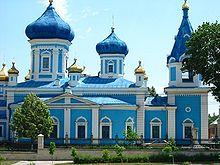
Politicized believers in Moldova represent independent Orthodox actors challenging the mainstream church from below, and their influence should not be overlooked, writes Anastasia Mitrofanova (Financial University under the Government of the Russian Federation) in a pre-published article (June 30, 2020) in Religion, State & Society. The article is based on ethnographic research, since the radicals produce few documents. Driven by a sense of apocalyptic times ahead and expecting the rule of the Antichrist to come soon (sometimes to the extent of hoarding food in underground shelters), radicals adopt an ambivalent behavior toward the structure of the Orthodox Church. A priest interviewed by Mitrofanova insists on remaining part of the canonical church (a self-governing Metropolitanate under the Russian Orthodox Church), but also claims that Patriarch Kirill promotes heretical teachings. He has actually stopped commemorating Patriarch Kirill and Metropolitan Vladimir during the liturgy, but neither he nor other priests holding similar views have been banned or defrocked. Some observers feel that radical clergy intimidates the church leadership, but the restraint of the church leadership in dealing with those priests and their followers may also be explained by the fact that they are seen as a welcome counterbalance against more liberal Orthodox circles.
Actually, as much as internal church issues and alleged heretical statements by the Patriarch, social and political issues appear to be core concerns of radical Orthodox groups. Developments unwelcome in the eyes of Orthodox hardliners tend to be associated with “Europe,” opposing the “European path” to the “Orthodox land.” “Like everywhere in post socialist Europe (…) the issue of LGBT rights in Moldova has  become a symbolic point for political differentiation,” Mitrofanova writes. Even secular politicians do not necessarily want to be associated with support for “gay rights.” The Orthodox radicals have also raised issues such as bar codes and machine-readable ID cards as “the Seal of the Antichrist,” but this does not matter to most of their fellow citizens. While the official views of the Orthodox Church may converge with those of the radicals on some issues, the church would refrain from anything resembling anti-state activities. In response to Pride parades, for instance, Orthodox radicals attempted to confront them on the street, while Orthodox mainstream organizations chose the path of organizing alternative events in support of the traditional family. In contrast with church leaders, the radicals—driven by their faith and perceiving violence as mere self-defense—are not willing to bargain or to engage into negotiations with state authorities through conventional channels, Mitrofanova adds. “Orthodox radicals have become a persistent political factor in Moldova, able to influence government policies and legislation,” she concludes.
become a symbolic point for political differentiation,” Mitrofanova writes. Even secular politicians do not necessarily want to be associated with support for “gay rights.” The Orthodox radicals have also raised issues such as bar codes and machine-readable ID cards as “the Seal of the Antichrist,” but this does not matter to most of their fellow citizens. While the official views of the Orthodox Church may converge with those of the radicals on some issues, the church would refrain from anything resembling anti-state activities. In response to Pride parades, for instance, Orthodox radicals attempted to confront them on the street, while Orthodox mainstream organizations chose the path of organizing alternative events in support of the traditional family. In contrast with church leaders, the radicals—driven by their faith and perceiving violence as mere self-defense—are not willing to bargain or to engage into negotiations with state authorities through conventional channels, Mitrofanova adds. “Orthodox radicals have become a persistent political factor in Moldova, able to influence government policies and legislation,” she concludes.
(Religion, State & Society, https://www.tandfonline.com/loi/crss20)